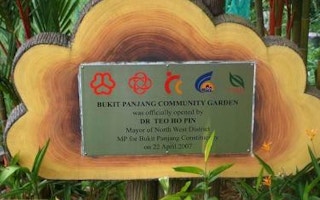Primary 6 pupil Hui Ling Ler, 12, of Yu Neng Primary School in Bedok has developed a habit of regularly checking on the school’s gardens.
During recess and after school, she and her classmates will diligently water the plants in the school’s 20 experimental plots. They are anxiously awaiting the first harvest of some seeds they planted earlier in January - square watermelons.
Yu Neng’s little plots are but one of a growing number of urban farms emerging across the island.
The square watermelon plots are part of a larger initiative by The Living Project - a joint venture between Alpha Biodiesel and farming and landscaping firm Garden Asia. It works with emerging gardens across Singapore and aims to source for corporate funding to keep the gardens going. So far, it has secured funding from Starbucks and Brewerkz and is in negotiation with other companies.
Alpha’s chief executive Allan Lim said the idea was hatched late last year with Garden Asia director Kenny Eng because they ‘wanted to change the way Singapore society eats’.
And so, Comcrop - short for ‘community crop’ - was born.
The Living Project, which has 10 gardens, plans to groom at least 25 more this year and even more the next. It will do so by recruiting Singapore’s almost 400 community gardens which are managed by residents’ committees islandwide.
The firm has calculated that with 100 farms of an average conservative size of 25 sq m - about half the size of a standard studio apartment - it could harvest enough vegetables to provide up to 2per cent of Singapore’s needs, and do its part in helping to reduce the country’s reliance on food imports.
‘It seems small, but actually, it is a sizeable quantity to produce. And every little bit counts towards improving Singapore’s food security,’ said Mr Lim.
The project is timely, given that food security has been a pressing issue for governments worldwide recently as global food prices soared for the eighth consecutive month in February to hit a new record.
World Bank chief Robert Zoellick warned last month that global food prices have reached ‘dangerous levels’, adding that the impact could complicate fragile political and social conditions in the Middle East and Central Asia.
Climate-related disasters, such as storms and droughts which have damaged the world’s agriculture-producing countries, will continue to disrupt supply even while demand is expected to go up.
The United Nations’ International Fund for Agricultural Development (Ifad) has said that global food production needs to rise by 70 per cent to meet the world’s population growth - expected to rise from sevenbillion this year to ninebillion by 2050.
So what does this mean for Singapore?
Industry experts interviewed by The Straits Times say it is high time food security featured more prominently in national debates. After all, Singapore imports more than 90 per cent of its food and is a price taker in global markets.
Inflation, which has been on the rise, has been partly fuelled by the rising costs of food, which accounts for 22 per cent of the consumer price index. In Singapore, food prices rose 0.9 per cent in January this year, compared with the month before.
Singapore Environment Council executive director Howard Shaw said: ‘We should consider food security with as much urgency and vigour as we have considered water and energy security.’
The Agri-Food and Veterinary Authority (AVA) has been taking steps to improve this over the years. It has diversified the city’s sources of food and partnered the private sector in projects such as the Jilin Food Zone in China, where key food items will be produced and secured for Singapore.
It has also set higher standards for the industry. Last week, it announced targets for local fish farms to increase productivity or face losing their licences.
The Government is also promoting local farming, which plays an important supporting role in ensuring food supply resilience. The AVA’s $10 million food fund, launched in 2009, helps firms raise farm efficiency by automating labour-intensive processes such as vegetable packing and feeding of fish.
Ifad regional economist of Asia-Pacific Ganesh Thapa said there is more Singapore can do to improve the stability of food supply in the region.
Ifad, which aims to eradicate rural poverty and ensure global food security, has 166 member states but Singapore is not one of them.
Mr Thapa said Singapore could consider joining the organisation, supporting it through donations or contributing to policy work.
Singapore’s strength as a finance centre can also play a role in empowering these communities, Ifad president Janayo Nwanze told The Straits Times in Rome last month. ‘Many of the farmers in South-east Asia lack access to loans. Through access to financial services and markets, such farmers can increase their productivity and strengthen the supply of food to the cities.’
Mr Nwanze also highlighted one other obstacle in ensuring the sustainability of global food production: Farmers suffer a poor image, and young people in particular do not think it is a respectable job.
In this regard, The Living Project hopes to help Singaporeans appreciate farming. Said Garden Asia’s Mr Eng: ‘We want them to appreciate growing their own food, appreciate what they eat.’
Source: The Straits Times










